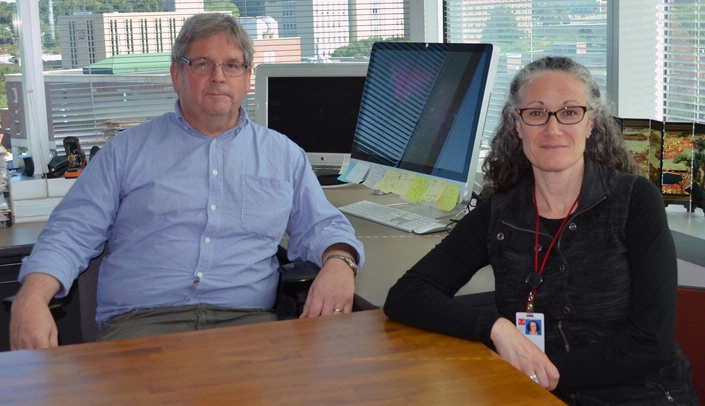The first class has matriculated into the Interdisciplinary Graduate Program in Biomedical Sciences (IGPBS). The silos are falling. Horizons are expanding.
Study and experience for Ph.D. students are becoming more and more interdisciplinary. Greater number of faculty are taking on greater roles.
“This is the way science is going,” said Karen Gould, Ph.D., associate professor and vice chair for graduate education, UNMC Department of Genetics, Cell Biology & Anatomy. “It’s evolving, becoming much more collaborative and interdisciplinary.”
“The days of the Lone Ranger scientist are mostly gone,” added Daniel Monaghan, Ph.D., professor in the UNMC Department of Pharmacology and Experimental Neuroscience.
And so UNMC reorganized its basic science Ph.D.-granting programs from the College of Medicine and Eppley Cancer Institute under a single umbrella, the IGPBS.
Drs. Gould and Monaghan are co-chairs of the committee that helped create the new program. Vimla Band, Ph.D., chair of the UNMC Department of Genetics, Cell Biology and Anatomy, chaired the initial task force on the project. While previously each program was separate, the IGPBS aims to break open department boundaries. Students are then free to follow their diverse interests, or collaborate with faculty from other areas. Meanwhile, clinical and bench researchers can better work together.
And while previously faculty were tethered to students, labs and programs within their respective departments, under the IGPBS, they can be affiliated with two or three different programs and can be “first-class citizens” within each. Rather than being bystanders, these faculty can now contribute to graduate committees, add their expertise to didactic training, give students a more well-rounded research experience and boost research across a spectrum of disciplines.
More than 200 faculty from more than 90 percent of UNMC’s research labs are now affiliated with IGPBS.
The new emphasis on interdisciplinary research, education and training also better positions UNMC to compete for National Institutes of Health (NIH) training grants.
Relative to peer institutions having similar levels of overall funding, UNMC is underfunded in terms of NIH training grants, Drs. Monaghan and Gould said.
Better training under the IGPBS model will enable UNMC to be even more competitive in recruiting students, Drs. Monaghan and Gould said, as it will provide more educational and research opportunities and a more robust interdisciplinary training for students. In turn, this approach should make its graduates more competitive for postdoctoral opportunities.
In the first year of the new model, with the first class of IGPBS scholars just enrolled, the program is now moving forward. As with any new program, program elements are being evaluated on an ongoing basis to determine if further improvements can be made, Dr. Monaghan said. To move to highly collaborative interdisciplinary training that seamlessly crosses department lines requires some change in culture, and that doesn’t happen quickly. But now there is a structure that can support that change.
